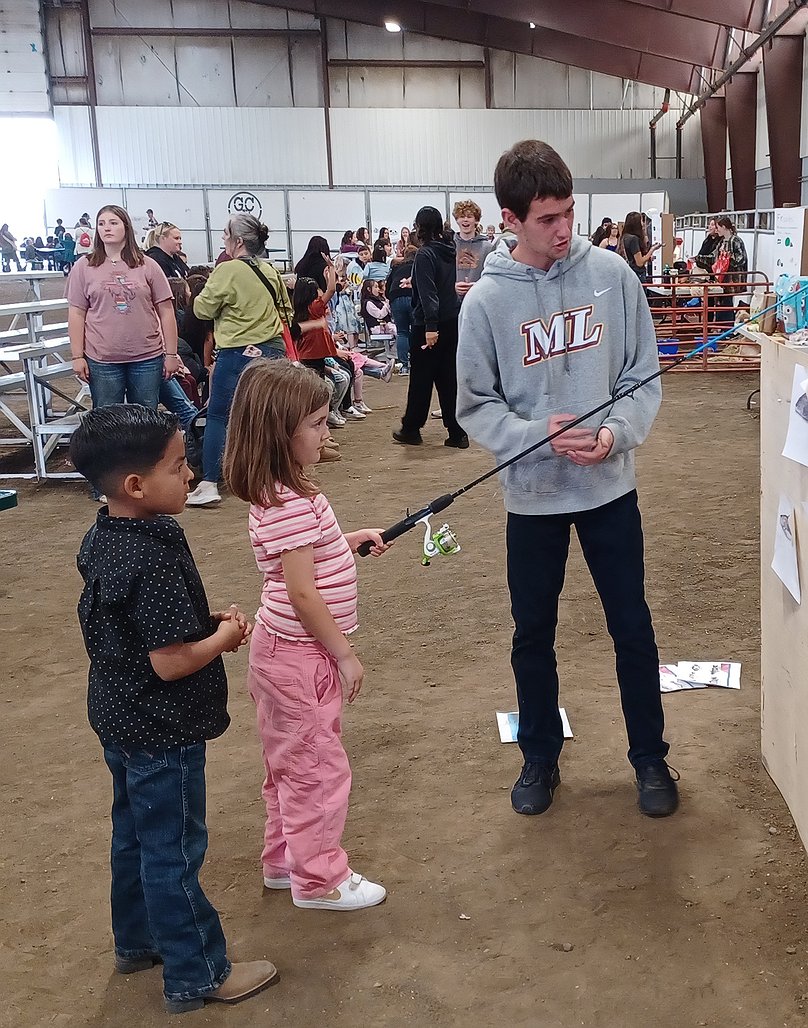Down on the farm
MOSES LAKE — More than 500 children got a close-up look at agriculture Wednesday at First Grade Farm Day on Moses Lake.
“It really comes back to ag advocacy,” said Moses Lake High School ag teacher Tony Kern. “Even though we’re in an agricultural community, there’s fewer and fewer people who actually know where their food comes from, how it’s made, being around animals or even understanding the breadth of agriculture.”
Farm Day is a deep-rooted tradition in Moses Lake. Kern has taught at MLHS for 26 years, he said, and he thought the event went back at least another 20 years before that. There was some question whether it would happen this year, with the budget problems the Moses Lake School District is experiencing, but the parent-teacher organizations of the various elementary schools pulled it off, he said.
The event was split into a morning and an afternoon session, to alleviate the crowding in the Kenny Ardell Pavilion at the Grant County Fairgrounds. All but a couple of Moses Lake’s public elementary schools brought their classes, as well as Moses Lake Christian Academy.
The pavilion had 24 stations set up where kids would spend about five minutes learning about some aspect of agriculture, from animals to plants to tractors, as well as some slightly peripheral subjects like farming and rodeo. Time to rotate was indicated with an air horn. The J.R. Simplot truck was there as well with fresh, hot french fries.
“Being able to expose these kids to (agriculture), hopefully it gives them a better understanding of ‘Oh, my food doesn't just come from the grocery store or Mom making it. It's produced,'” Kern said. “And when you look out the window as you're driving out of town and you see those fields, that hopefully builds that connection.”
By far the most popular stops were the live animals, including chickens, goats and rabbits, in pens in the middle of the pavilion for easy petting access.
“They love the animals,” said Longview Elementary School teacher Donel Dalrymple. “Going to a corn presentation, that’s all good, but there’s no animals there. They’re listening, but if there’s animals, that’s when they’re really excited.”
One of those pens was a goat pen where MLHS student Ariel Montoya was tending the flock.
“I hear a lot of ‘Are they sheep?’” Montoya said. “(The kids) are also wanting to pet them, but they’re a little skittish sometimes.”
Over by the wall, Colton Lucero was teaching first-graders about fish, helping them cast little fishing poles over a cardboard wall.
“We have pictures of saltwater fish on the board and then I have pictures of freshwater fish on a paper that I show them,” Lucero said. “We get a couple of kids and let them use the fishing pole and catch a fish and a candy and then they get to tell me if they think (the fish) lives in the ocean or the lake.”
“For our high school kids, it's an amazing opportunity for them to present to in a high-reward, low-risk (situation), because their audience is first-graders,” Kern said. “So it's not like you're making a presentation to your teachers or other high school kids, where you feel like you have to have super in-depth knowledge. It's at a lower level, but the first graders are an antenna, and they will tell you if your message is hitting home or not.”
The proportion of the population that farms has dropped over the years, but Kern said seeing the students in his programs gives him some hope for the future.
“This is really a diverse group of presenters,” he said. “They're definitely not all from an ag background … We're trying to create that next generation of folks to go into agriculture, because as much as people might say this, that or the other thing, it's one field that is never going away, because everybody's got to eat. It is important, and it's exciting, and there's so many different opportunities.”





